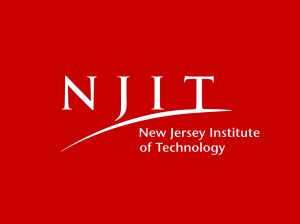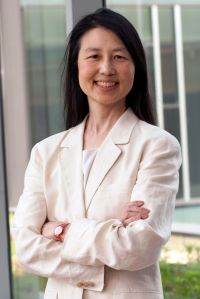 February, 2019
February, 2019
DIMACS is pleased to welcome the New Jersey Institute of Technology (NJIT) as a new DIMACS institutional affiliate partner. DIMACS and NJIT invite the DIMACS community to join in celebrating this new partnership on March 13 at NJIT.
The “Celebratory Mixer - Welcoming NJIT as a DIMACS Partner” is hosted by NJIT to introduce new DIMACS members from NJIT to the rest of the DIMACS community. The event features keynote talks by Jeannette Wing, a professor of computer science and director of the Data Science Institute at Columbia University and former Assistant Director of the National Science Foundation, and Craig Gotsman, a professor of computer science and dean of Ying Wu College of Computing at NJIT. The event also includes a series of “lightning talks” and a reception to help people get to know each other and learn more about the breadth of research being conducted within our community.
If you would like to attend the Celebratory Mixer, please go to the event’s webpage to register. Information on how to submit a lightning talk is provided under the "Call for Participation". The event is open to everyone, and anyone may submit a lightning talk to very briefly describe their work. We especially welcome students and postdocs.
When it was founded in 1989, DIMACS was a partnership of four academic and industrial institutions based in New Jersey – Rutgers University, Princeton University, AT&T, and Bellcore. Since its founding, DIMACS has added academic and industrial partners to broaden both its scientific community and its geographic footprint. In addition to Rutgers, Princeton, and NJIT, DIMACS’s academic partners include Columbia University, Georgia Institute of Technology, Rensselaer Polytechnic Institute, and Stevens Institute of Technology, while its industry partners include AT&T, Avaya, IBM Research, Microsoft Research, NEC Laboratories America, Nokia Bell Labs, and Perspecta Labs. Representatives from these partner institutions participate in the governance of DIMACS and assist in all aspects of planning and executing programs led by DIMACS.
Baruch Schieber became chair of NJIT's computer science department in the fall of 2018 and set the wheels in motion for NJIT to become a DIMACS partner. He said, “As a long-time member of DIMACS, I learned to appreciate its mission and activities. Given the proximity of the two institutions and the common research interests of the faculty members in both institutions, I am confident that this new partnership will benefit both DIMACS and NJIT.”
Fred Roberts, interim director of DIMACS, echoes Schieber’s enthusiasm noting, “The strength of the DIMACS community draws heavily from the commitment and vision of its partners. Adding a new partner brings new energy and new ideas and is something that we like to celebrate.” In addition, Roberts pointed out that with rapidly evolving modern topics, DIMACS is moving in new directions, and this event offers the opportunity for members and friends of DIMACS to contribute to a dialogue about these directions.
Please join us on March 13 at NJIT!
Read a post-Mixer story about the event in NJIT News.
Jeannette Wing, Avanessians Director of the Data Science Institute and Professor of Computer Science, Columbia University
 Data for Good: Data Science at Columbia: Every field has data. We use data to discover new knowledge, to interpret the world, to make decisions, and even to predict the future. The recent convergence of big data, cloud computing, and novel machine learning algorithms and statistical methods is causing an explosive interest in data science and its applicability to all fields. This convergence has already enabled the automation of some tasks that better human performance. The novel capabilities we derive from data science will drive our cars, treat disease, and keep us safe. At the same time, such capabilities risk leading to biased, inappropriate, or unintended action. The design of data science solutions requires both excellence in the fundamentals of the field and expertise to develop applications which meet human challenges without creating even greater risk.
Data for Good: Data Science at Columbia: Every field has data. We use data to discover new knowledge, to interpret the world, to make decisions, and even to predict the future. The recent convergence of big data, cloud computing, and novel machine learning algorithms and statistical methods is causing an explosive interest in data science and its applicability to all fields. This convergence has already enabled the automation of some tasks that better human performance. The novel capabilities we derive from data science will drive our cars, treat disease, and keep us safe. At the same time, such capabilities risk leading to biased, inappropriate, or unintended action. The design of data science solutions requires both excellence in the fundamentals of the field and expertise to develop applications which meet human challenges without creating even greater risk.
The Data Science Institute at Columbia University promotes “Data for Good”: using data to address societal challenges and bringing humanistic perspectives as—not after—new science and technology is invented. Started in 2012, the Institute is now a university-level institute representing over 300 affiliated faculty from 12 different schools across campus. Data science literally touches every corner of the university. This talk presents the mission of the Institute and highlights of its educational and research activities.
Craig Gotsman, Distinguished Professor of Computer Science and Dean of the Ying Wu College of Computing, NJIT
A Scalable Heuristic for Fastest-Path Computation on Very Large Road Maps:  This talk will present a simple but very effective improvement to a variant of the classical shortest-path algorithm, a cornerstone in computer science. The fastest-path (or minimal travel time) query between two points in a very large road map is an increasingly important primitive in modern transportation and navigation systems, thus very efficient computation of these paths on detailed road maps under dynamic traffic conditions is critical for system performance and throughput. We present a method to compute an effective admissible heuristic for the fastest path travel time between two points on a road map, which can be used to significantly accelerate the classical A* algorithm when computing fastest paths in road maps. Our method is based on two hierarchical sets of separators of the map represented by two binary trees. A preprocessing step computes a short vector of values per road junction based on the separator trees, which is then stored with the map and used to efficiently compute the heuristic at the online query stage. We demonstrate experimentally that this method scales well to maps at the continental level, providing a better quality heuristic, thus more efficient A* search, for fastest path queries between points at all distances, relative to other known heuristics. Joint work with Renjie Chen - Max-Planck Institute for Informatics, Saarbrücken, Germany.
This talk will present a simple but very effective improvement to a variant of the classical shortest-path algorithm, a cornerstone in computer science. The fastest-path (or minimal travel time) query between two points in a very large road map is an increasingly important primitive in modern transportation and navigation systems, thus very efficient computation of these paths on detailed road maps under dynamic traffic conditions is critical for system performance and throughput. We present a method to compute an effective admissible heuristic for the fastest path travel time between two points on a road map, which can be used to significantly accelerate the classical A* algorithm when computing fastest paths in road maps. Our method is based on two hierarchical sets of separators of the map represented by two binary trees. A preprocessing step computes a short vector of values per road junction based on the separator trees, which is then stored with the map and used to efficiently compute the heuristic at the online query stage. We demonstrate experimentally that this method scales well to maps at the continental level, providing a better quality heuristic, thus more efficient A* search, for fastest path queries between points at all distances, relative to other known heuristics. Joint work with Renjie Chen - Max-Planck Institute for Informatics, Saarbrücken, Germany.


